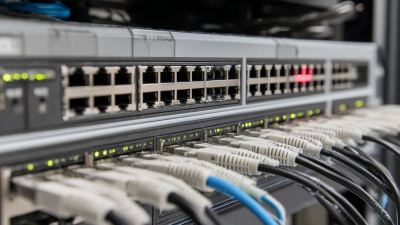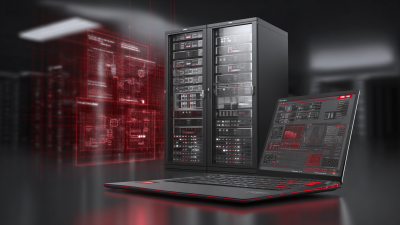Leave Your Message
In today's fast-paced digital landscape, the need for portable, high-performance computing solutions has never been more crucial. Enter the Laptop Server, an innovative blend of mobility and server capabilities that caters to the modern professional's diverse needs. As companies and individuals alike strive for ultimate flexibility in their operations, the Laptop Server emerges as a compelling investment, offering robust processing power and the ability to run complex applications from virtually anywhere.

This remarkable device not only provides the necessary performance for intensive tasks but also allows seamless transition between work environments, whether in a bustling office or a cozy home setting. In this exploration, we will delve into the unique attributes of Laptop Servers, highlighting their strategic benefits, potential use cases, and the reasons why they should be an essential part of your technology arsenal.
In modern computing environments, laptop servers are emerging as a versatile solution that combines portability with high performance. With the capacity to handle demanding workloads, these servers can be essential for businesses looking to maximize flexibility and efficiency. They enable seamless integration of advanced technologies, like AI and cloud computing, responding effectively to the needs of data-heavy applications.
**Tips:** When considering a laptop server for your business, assess the critical applications you'll run. Ensure the server supports required hardware configurations, such as multiple GPUs and high memory capacities. This will ensure your system can handle intense tasks like AI model training or complex data analysis without bottlenecks.
Moreover, the growing market for Linux systems indicates an expanding ecosystem for server applications. This growth can influence your choice of operating systems, enhancing compatibility and offering robust support for open-source technologies. **Tips:** Explore Linux distributions designed for servers, as they often provide greater stability and security. Look for community support and documentation to ease the installation process and optimize performance in a multi-user environment.
| Feature | Standard Laptop Server | High-Performance Laptop Server | Typical Use Cases |
|---|---|---|---|
| Processor Type | Dual-Core | Multi-Core (i7 or Ryzen 7) | Web Hosting, Development |
| RAM | 8 GB | 16 GB or More | Data Analysis, Virtual Machines |
| Storage Type | HDD | SSD | Database Management, High-Speed Access |
| Weight | 4-5 lbs | 5-7 lbs | Portable Computing, Remote Access |
| Battery Life | 4-6 hours | 3-5 hours | On-the-Go Processing, Edge Computing |
Laptop servers are rapidly gaining traction as a superior investment compared to traditional options, particularly for those seeking ultimate flexibility and performance. One of the key performance metrics where laptop servers shine is their portability. Unlike bulky desktop servers, a laptop server can be easily transported, allowing users to set up and manage their operations anywhere. This on-the-go capability is especially valuable for businesses with mobile teams or remote working arrangements, contributing to enhanced productivity and efficiency.
Another significant advantage of laptop servers is their energy efficiency. They are designed to consume less power than traditional servers while providing the same, if not better, computational performance. This aspect not only reduces operational costs but also decreases the overall carbon footprint, appealing to environmentally conscious businesses.
**Tips:** When considering a laptop server for your investment, pay close attention to the specifications such as processor speed and memory capacity. Opt for models with strong thermal management to ensure they can handle demanding workloads without overheating. Furthermore, keep scalability in mind; choose a configuration that allows for future upgrades as your needs evolve.
This bar chart illustrates the performance metrics of Laptop Servers compared to Traditional Servers across four key dimensions: CPU Performance, RAM Speed, Storage Speed, and Power Efficiency. Laptop Servers demonstrate superior capabilities in these areas, highlighting their benefits for flexibility and performance in modern computing environments.
Investing in a laptop server offers remarkable cost-effectiveness, particularly when considering the shifting demands of tech-driven businesses. According to recent industry data, the total cost of ownership for traditional server setups can exceed $30,000 annually, including hardware, maintenance, and operational costs. In contrast, deploying a laptop server can yield substantial savings in both initial investment and ongoing expenses. A well-configured laptop server can provide enough power and flexibility for application development, data processing, and even hosting, all within a budget-friendly range of about $2,000 to $5,000.

Moreover, as more organizations embrace remote work and hybrid models, the initial investment in a laptop server becomes increasingly justifiable. A recent report indicates that nearly 70% of companies are prioritizing mobile computing technology, setting aside significant budgets for these tools. By leveraging a laptop server, businesses can avoid high rental fees for data center space and the costs associated with cloud services, which can approach $1,200 a month for mid-tier solutions. Investing in a laptop server not only enhances performance but also provides the scalability needed to adapt to future growth without breaking the bank.
In today’s fast-paced digital landscape, the demand for flexibility and portability in computing infrastructure has never been greater. Laptop servers offer a unique solution that combines high performance with the convenience of mobility, allowing users to take their powerful infrastructure anywhere. According to a recent report by Statista, the global server market is projected to reach $113 billion by 2025, as organizations increasingly recognize the need for adaptable solutions that can scale with their requirements.
Having a laptop server empowers professionals to work from virtually any location, whether it be at home, in a café, or while traveling. This level of portability not only enhances productivity but also caters to the growing trend of remote work. A survey from Gartner reveals that 74% of CFOs plan to shift some employees to remote work permanently, highlighting the need for reliable and mobile IT solutions.
**Tips:**
When selecting a laptop server, prioritize devices that offer robust processing power and extensive storage. Look for features such as high-speed SSDs and multi-core processors to ensure seamless performance. Additionally, consider investing in a lightweight design that maintains durability, as you’ll want a server that can withstand the rigors of travel while still providing top-notch capabilities.
As technology continues to evolve, investing in a laptop server is a strategic decision that offers remarkable long-term benefits for both personal and professional use. A laptop server not only provides the ultimate flexibility in deployment and usage but also ensures that users remain prepared for future advancements. The rapid pace of development in computing technology means that traditional setups may soon become obsolete; however, a laptop server can easily adapt to new software releases and hardware upgrades, allowing users to maintain high performance without the typical costs associated with overhauling their systems.

In a landscape marked by innovations such as the latest GPU advancements and power supply upgrades, integrating a laptop server into your tech ecosystem ensures you are equipped for future demands. With technologies progressing at an unprecedented rate, a laptop server’s capability to expand and integrate with cutting-edge equipment can significantly enhance your computing experience. This future-proofing aspect helps users maximize productivity while minimizing the need for frequent investments in new hardware, ultimately leading to a more sustainable and efficient approach to technology management.






